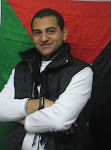 Having walked across the dead bodies of my relatives and people and having experienced their deaths; I still want peace, I still dream of peace and security for the families of Gaza and all of Palestine
Having walked across the dead bodies of my relatives and people and having experienced their deaths; I still want peace, I still dream of peace and security for the families of Gaza and all of PalestineI come from an area of the world that has been violated; violated of our human rights for decades, which continues up to this very day, to this very moment as I speak these words. I have come from the heart of Israeli-Palestinian conflict to study, not necessarily to understand my conflict better, as I have lived the conflict my entire life, but to find a means to ending the conflict, and to attaining peace and justice for my people.
It was not easy for me to come here, as I struggled for many months with the idea, and the possibility, of not being able to make it through the Gaza Siege, the complete and total enclosure of Gaza from the rest of the world. Only through the efforts of many people, including those of you in my class that supported me in my time of need, was I able to break through the siege and ultimately make it here to Castellon where I share with you these words today.
I am sincerely grateful to my new university, the university of Jaume Primer, my classmates, professors and the administration for all of your support in making this master program a possibility for Ayman Quader. I believe that my experiences and hardships in Gaza will bring a fresh dimension and perspective to the study of conflict, development and peace studies.
It is my hope that my presence with you here today, and in the coming months, in this congress, might assure me that justice and peace will prevail one day in the near future. When I was initially stuck in the Gaza Strip and unable to travel hear and when my eventual presence in Castellon was still in doubt, I was really frustrated because I was just asking for a very basic right human right, which is the right of education. Such a right is guaranteed under international laws and conventions. After a long battle, which fortunately resulted in me being here, I can’t find the words to truly express to all of you how much it really means for me to be here; not only for me, but for my family and my friends that are still stuck in Gaza without any proper means to sustain themselves and their basic needs.
Coming from the conflict, and growing up in the conflict, it is difficult for me to step outside of the injustice that I have suffered and to glean differing perspectives on the situation in Gaza and in Palestine, and it is my hope that this program will give me the perspective to be able to do this, while applying an academic framework that incorporates the prospects of peace and development. This is truly what I feel Gaza needs at this point in time. We are a damaged people, an abused people; because of the injustice that is taking place in Gaza, it can be extremely difficult for many of us to break through the anger and pain of the occupation, and to seek a peaceful solution. Many of my brothers and sisters in Gaza have experienced so much injustice, that it is almost impossible to seek a solution to the conflict through peaceful means. It is especially for these people that I am here today.
While I hope to learn basic frameworks for applying peace and conflict resolution to my homeland of Palestine, without the end to the human rights violations that have occurred over the course of nearly 62 years, without the end to the oppression of my people and the hope for sovereignty and freedom for the future, such a conflict can never be solved. In 1948, 750,000 Palestinians were ethnically cleansed from their ancient homelands, and to this day, no reparations have been made for this initial injustice, an injustice which continues to this day with the continued annexation, for colonial settlement, of East Jerusalem and the West Bank – contrary to international law and many UN resolutions – and the brutal siege on the Gaza Strip, which escalated to a full scale attack on civilian infrastructure in Gaza in the winter of 2008-2009; an escalation in which 1,400 Palestinians lost their lives. The destruction in Gaza last winter was truly horrifying.
This is the basis of the Palestinian struggle, of my personal struggle; the struggle for justice in a land of injustice and personal struggle. It is my hope and my dream that I will be able to learn something over the course of the next two years that will help my people to overcome this struggle for justice and for peace.
=============================
Ayman T. Qwaider
International Master Postgraduate Official Programme in Peace, Conflict and
Development Studies - UNESCO Chair in Philosophy for Peace - Gaza
University of Jaume I
Av. Vicent Sos Baynat
12006. Castellon de la Plana, SPAIN.
+34 648 44 11 98
E-mail: ayman.qauder@gmail.com
Skype: peaceforgaza
Facebook: ayman.quader
Twitter: peaceforgaza
Web: www.peaceforgaza.blogspot.com
www.paltelegraph.com
http:picasaweb.google.com/ayman.qauder
=============================






